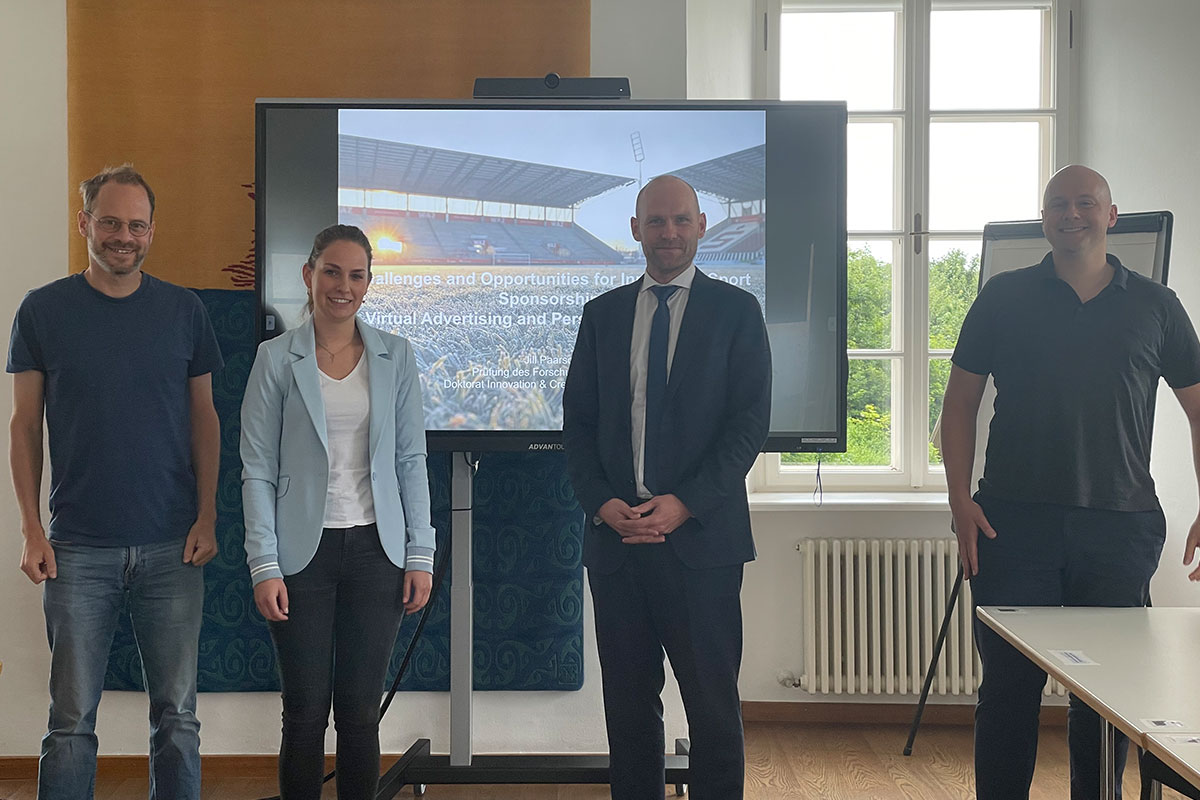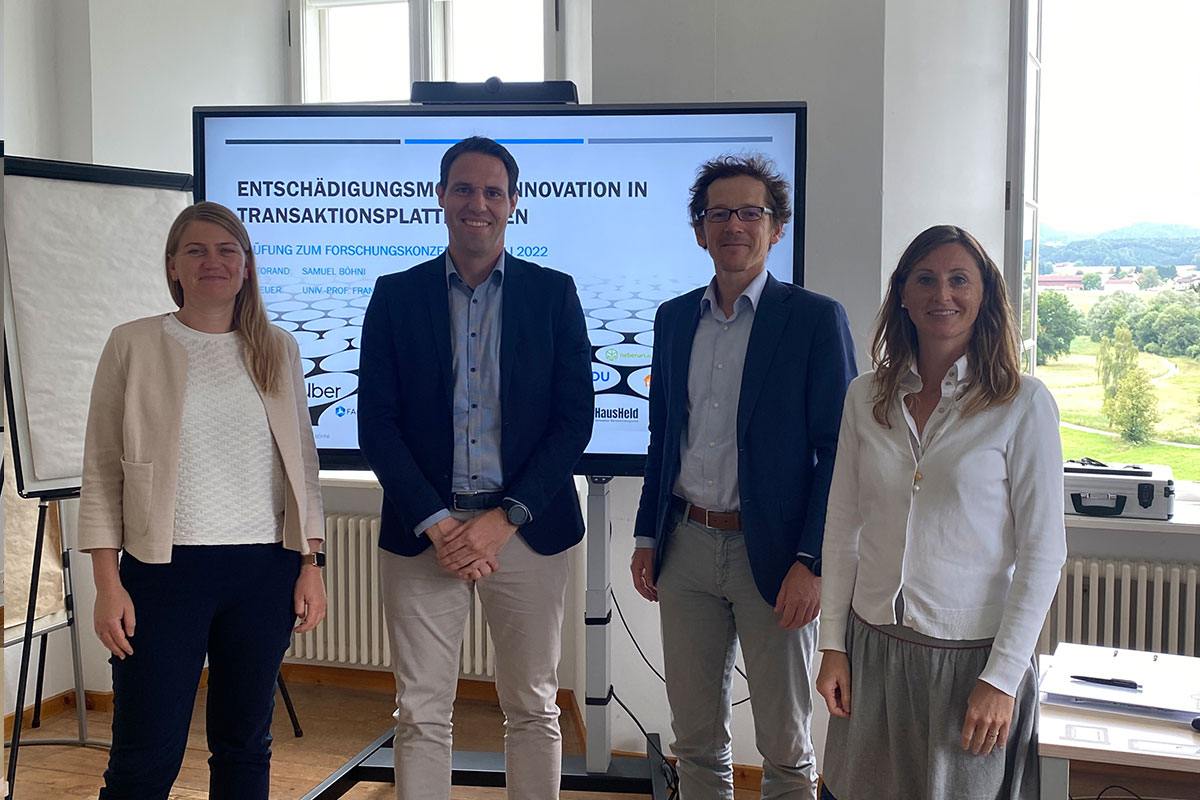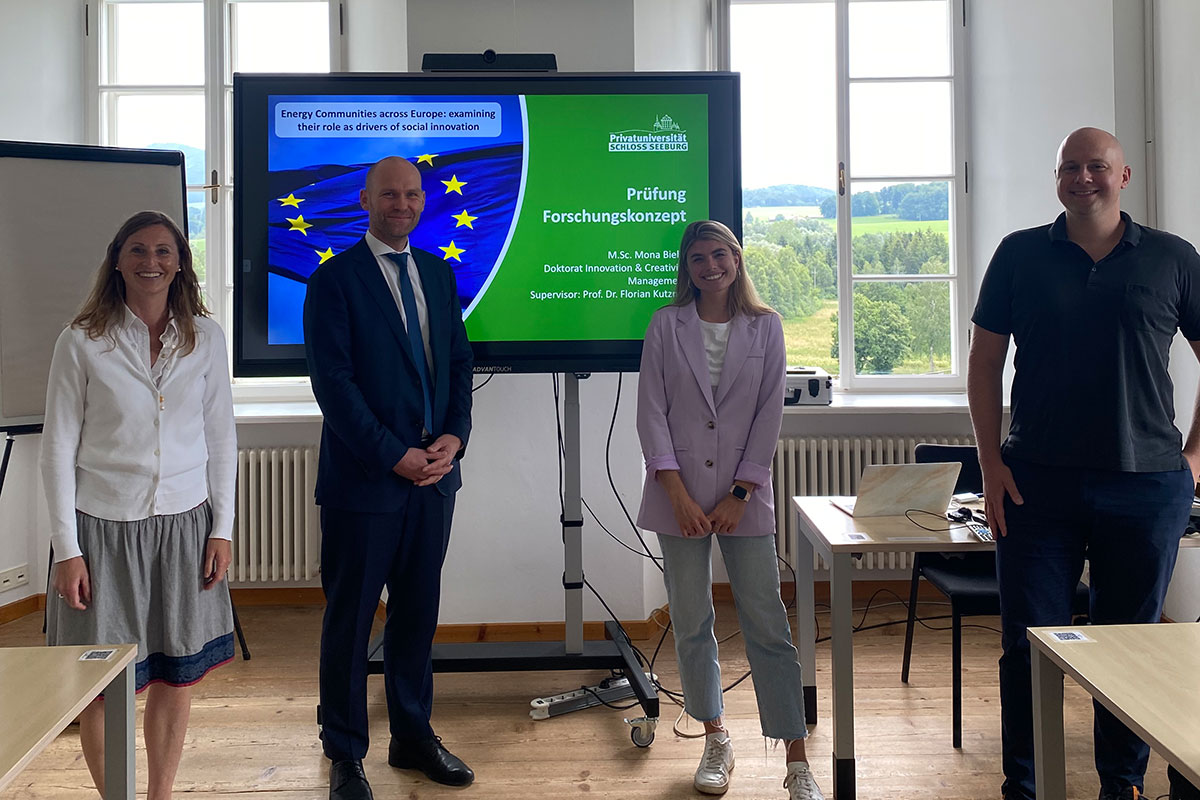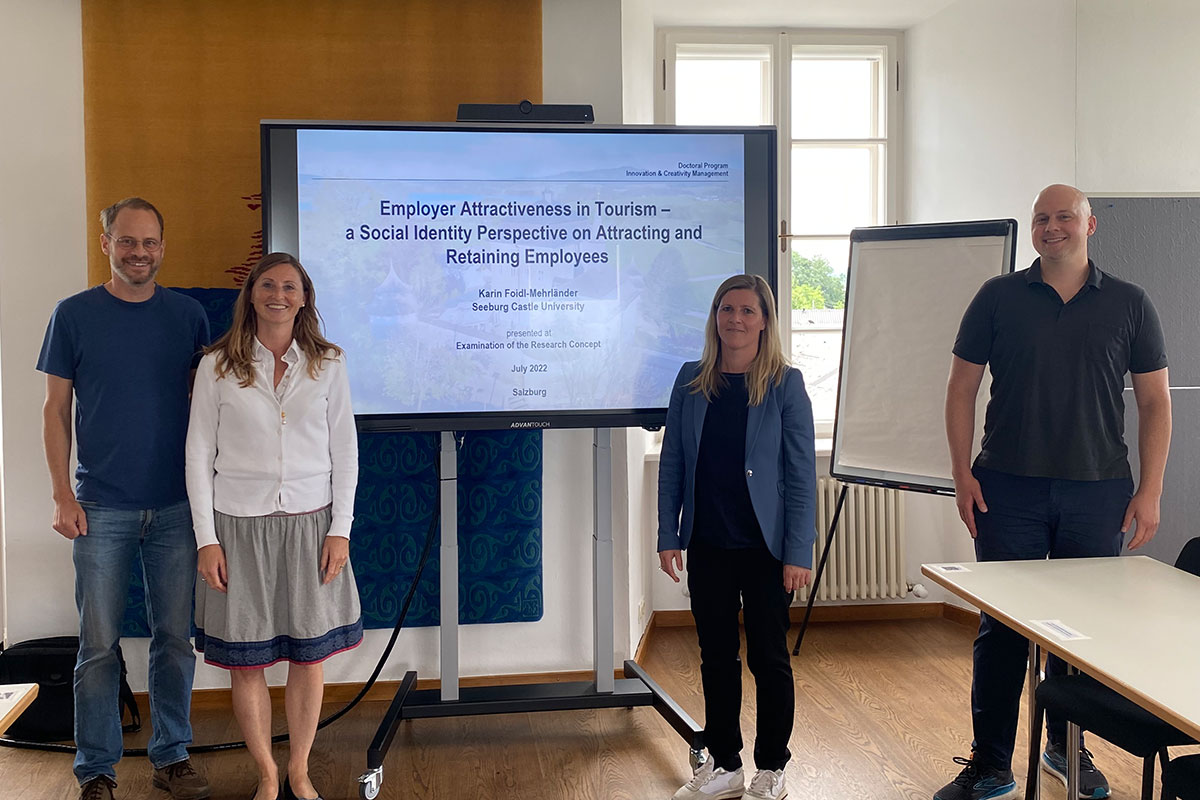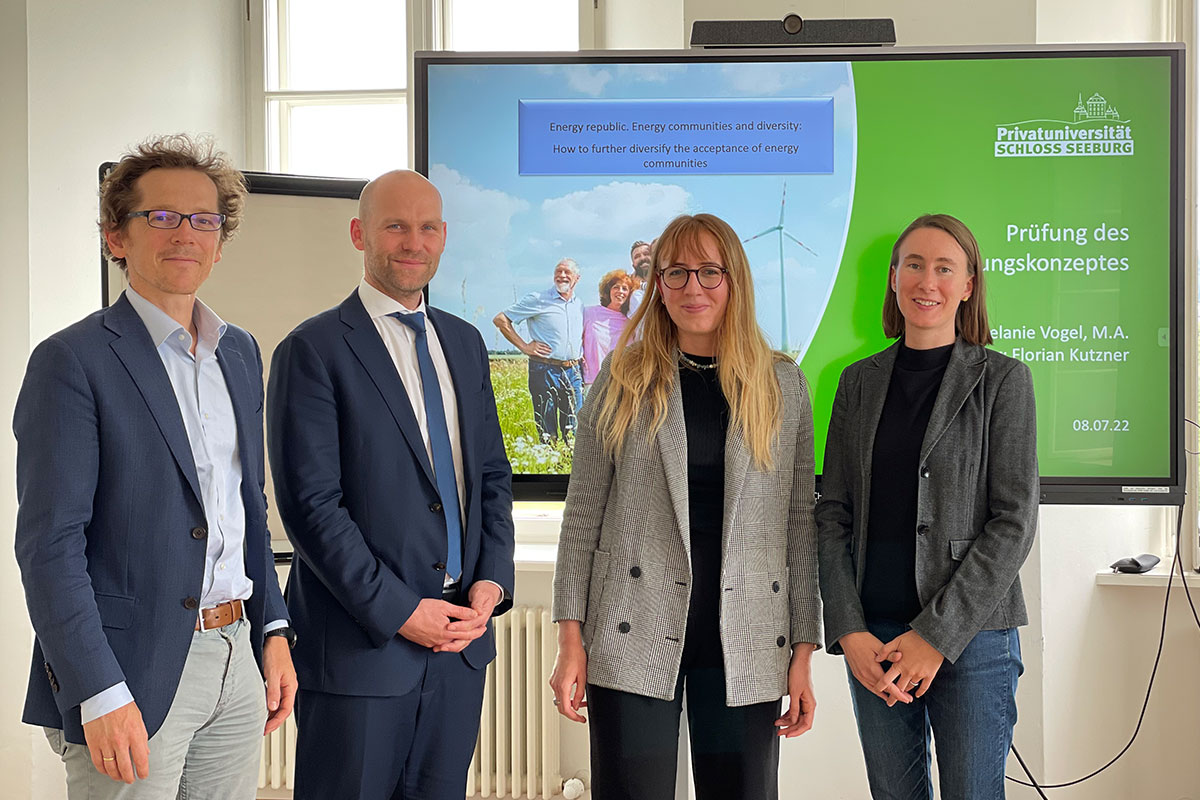Professur für Wirtschaftspsychologie, insbesondere behavioural public policy
Google H-Index [output_hindex author_id=”_ucRkM4AAAAJ&hl” js_output=”false”]

Univ.-Prof. Dr. Florian Kutzner
Telefon: +43 6212 2626 61
E-Mail: florian.kutzner@uni-seeburg.at
Lebenslauf Univ.-Prof. Dr. Florian Kutzner
| Persönliche Angaben | |
| 01.03.1978 | Geboren in München, Deutschland |
| Beruflicher Werdegang | |
| Seit 2021 | Professor für Wirtschaftspsychologie, insbesondere behavioural public policy, Studiengangsleiter Wirtschaftspsychologie an der Privatuniversität Schloss Seeburg |
| Seit 2013 | Akademischer Rat auf Zeit, Lehrstuhl Prof. Klaus Fiedler, Psychologisches Institut, Universität Heidelberg |
| 2012-2013 | Post-Doctoral Research Fellow an der Warwick Business School, Großbritannien (Kollaboration mit Prof. Nick Chater finanziert durch die Deutsche Forschungsgemeinschaft, DFG) |
| 2009-2012 | Akademischer Rat, Abteilung für Sozialpsychologie, Psychologisches Institut, Universität Heidelberg |
| Ausbildung | |
| 07/2018 | Habilitation zum Thema „From information samples to decisions under uncertainty: Implications for social cognition, risk taking and consumer behavior“ |
| 01/2016 | Ernennung zum Nachwuchsgruppenleiter und Verleihung des Promotionsrechts |
| 11/2009-11/2010 | Lehraufträge am Lehrstuhl für Sozialpsychologie der Universität Basel |
| 05/2006-09/2009 | Promotion, Abteilung für Sozialpsychologie, Psychologisches Institut, Universität Heidelberg (Dr. Phil., Note Summa Cum Laude) |
| 10/2003-03/2006 | Diplomstudium Psychologie an der Friedrich Schiller University Jena |
| 04/2003-09/2003 | Diplomstudium an der Universität Hamburg |
| 02/2002-02/2003 | Masters Studium Psychologie an der University of Otago, New Zealand |
| Aktivitäten in der Wissenschaftlichen Gemeinschaft | |
| Ad-Hoc Reviewer | Acta Psychologica, Cognitive Science, Consciousness & Cognition, Economic Psychology, European Journal of Social Psychology, European Research Council, Experimental Psychology, German-Israel Foundation, Journal of Pragmatics, Journal of Dynamic Decision Making, Journal of Experimental Psychology: LMC, Journal of Experimental Social Psychology, Psychological Science, Psychology of Sports and Exercise, Social Behavior and Personality, Social Cognition, Social Psychology |
| Forschungsprojekte | |
| Seit 11/2020 | 3,5-jährige Projektförderung (Horizon2020) mit dem Titel „RENergetic – Urban Islands: Based on Communities and Renewable Energy“ durch die Europäische Kommission |
| Seit 06/2020 | 3-jährige Projektförderung (Horizon2020) mit dem Titel „DECIDE – Accelerating collective energy actions“ durch die Europäische Kommission |
| Seit 10/2019 | 1-jährige Projektförderung im Rahmen der Under2Coalition (www.under2coalition.org) zur Wirkung hochaufgelöster Treibhausgas-informationen auf politische und individuelle Entscheidungen |
| Seit 06/2019 | 3-jährige Projektförderung (Horizon2020) mit dem Titel „PAsCAL – Enhance driver behaviour and Public Acceptance of Connected and Autonomous vehicLes“ durch die Europäische Kommission |
| Seit 09/2016 | 3-jährige Projektförderung (Horizon2020) mit dem Titel „ELECTRIFIC – Enabling seamless electromobility through smart vehicle-grid integration“ durch die Europäische Kommission |
| Seit 10/2015 | Mitautor (Hauptantragsteller Prof. Mario Ferreira) einer 3-jährigen Projektförderung zum Thema „Fighting over-indebtedness – self-regulation and choice architecture“ gefördert durch die Portuguese Science Foundation |
| 10/2015-09/2017 | 2-jährige Projektförderung zum Thema „Defaults und soziale Normen: Zur Beständigkeit von „Nudging“ – Interventionen bei der Förderung nachhaltigen Verhaltens“ gefördert durch die Exzellenzinitiative an der Universität Heidelberg, FoF 4 „Regulation and Self-regulation“ |
| 04/2013-03/2016 | 3-jährige Projektförderung zum Thema „Decisions based on features and dimensions: How contextual framing changes processing¬” als Teil der DFG – Forschergruppe “Contextualized Decision Making: Investigating Mediators and Moderators” |
| 12/2012 | Sachmittelförderung der Warwick University zum Thema „The framed nature of salience: Bridging the gap between attention and decision making research“ (in Kollaboration mit Prof. Derrick Watson) |
| 09/2012-08/2013 | Forschungsstipendium de |
Professur in Zahlen
Teammitglieder und betreute Dissertant:innen
Celina Kacpersksi
Postdoc. Projektmitarbeiterin
Technology acceptance, behavior change, data science for sustainability

Mona Bielig
Interne Dissertantin
Akzeptanz und Effekte der Energiewende, mit Fokus auf Verhaltensrebounds und sozialen Auswirkungen

Melanie Vogel
Interne Dissertantin
Gender in der Energiewende, mit Fokus auf “prosumerism” und Energiegenossenschaften

Daniel Guzmics
Externer Dissertant
Nachhaltige Mobilität, mit Fokus auf die corporate mobilityLukas Blunder
Externer Dissertant
Digitale Medien und politische Meinungsbildung
Mona Bielig
Mona Bielig, …
Melanie Vogel
Celina Kacpersksi
Celina Kacpersksi,
Lukas Blunder
Lukas Blunder,
Daniel Guzmics
Profil der Professur
- Bürgerenergie (Bielig, Vogel, Kacperski)
- Circular Economy & recycling
- Diverstiy Equality Inclusion (Vogel)
- Entscheiden in digitalen Umwelten: Fake-news, post-truth, Greenwahsing
- Smartes Heizen und Kühlen
- Sustainable consumption
- Sustainable mobility
- German Psychological Society (DGPs)
- Division of Social Psychology (DGPs)
- European Association of Social Psychology (EASP)
- Mona Bielig (Doktorandin, intern)
- Melanie Vogel (Doktorandin, intern)
- Celina Kacpersksi (Postdoktorandin, intern)
- Lukas Blunder (Doktorand, extern)
- Daniel Guzmics (Doktorand, extern)
Über Univ.-Prof. Dr. Florian Kutzner
Univ. Prof. PD Dr. Florian Kutzner, ist seit 2020 Professor für Wirtschaftspsychologie an der Privatuniversität Schloss Seeburg. Sein akademischer Werdegang führte ihn an international anerkannte Universitäten wie Heidelberg, Mannheim, Jena, Dunedin und Warwick, wo er in Psychologie studierte, promovierte und schließlich in Psychologie habilitierte. Die Kernthematik der Professur liegt im Bereich “Behavioral Public Policy”. Genauer geht es darum, die Akzeptanz und die Auswirkungen von Maßnahmen zur Verhaltenssteuerung in den Feldern Energie, Mobilität und digitale Medien zu verstehen und zu optimieren. Mit einem Fokus auf transdisziplinäre Forschung, ist die Professur forschungsintensiv und nimmt aktiv an europäischen Verbundprojekten (H2020) teil. Zudem zeichnet sich Prof. Kutzner durch mehr als ein Jahrzehnt Erfahrung in verhaltenswissenschaftlichen Beratungsprojekten aus, die er vor allem in Zusammenarbeit mit NGOs und öffentlichen Verwaltungen durchführt. Sein besonderes Augenmerk liegt hierbei auf den Nachhaltigkeitszielen (SDGs) 2, 5, 7, 12, 13 und 17.
Meine Buchempfehlung
Meine Podcastempfehlung
Meine favorisierte Publikation
Mein Lieblingszitat
Willy Brandt, 3. November 1981
Awards und Auszeichnungen der Professur
2020: …
Publikationen und Transferleistungen der Professur
Schlüsselpublikationen
Bielig, M., Kacperski, C., Kutzner, F., & Klingert, S. (2022). Evidence behind the narrative: Critically reviewing the social impact of energy communities in Europe. Energy Research & Social Science, 94, 102859. https://doi.org/10.1016/j.erss.2022.102859
Figueroa, A., de Molière, L., Pegels, A., Never, B., & Kutzner, F. (2019). Show me (more than) the money! Assessing the social and psychological dimensions to energy efficient lighting in Kenya. Energy Research & Social Science, 47, 224–232. https://doi.org/10.1016/j.erss.2018.10.002
Herberz, M., Kacperski, C., & Kutzner, F. (2019). Reducing the time loss bias: Two ways to improved driving safety and energy efficiency. Accident Analysis & Prevention, 131, 8–14. https://doi.org/10.1016/j.aap.2019.06.007
Kacperski, C., Bielig, M., Klingert, S., & Kutzner, F. (2023). For the climate, my friends, or my region? An experimental field trial for prosumer engagement with peer-to-peer energy trading in Austria. Energy Research & Social Science, 97, 103000. https://doi.org/10.1016/j.erss.2023.103000
Pegels, A., Castaneda, J. L., Humphreys, C., Kötter, C., Negre, M., Weidner, C., & Kutzner, F. (2022). Aligning recycling behaviors and the recycling system – Towards a full cycle of materials and behavioral methods. Waste Management, 138, 1-7. https://doi.org/10.1016/j.wasman.2021.11.021
Kuhn, S., Kutzner, F., & Thogersen, J. (2022). How to make energy efficiency labels more effective: Insights from discrete choice experiments in Ghana and the Philippines. Energy Research & Social Science, 84, 1-15.https://doi.org/10.1016/j.erss.2021.102320
Kacperski, C., Kutzner, F., & Vogel, T. (2021). Consequences of autonomous vehicles: Ambivalent expectations and their impact on acceptance. Transportation Research Part F: Traffic Psychology and Behaviour, 81, 282–294. https://doi.org/10.1016/j.trf.2021.06.004
Kuhn, S., Ihmels, M., & Kutzner, F. (2021). Organic defaults in online-shopping: Immediate effects but no spillover to similar choices. Journal of Consumer Behaviour, 20(2), 271–287. https://doi.org/10.1002/cb.1850
Kutzner, F., Kacperski, C., Schramm, D., & Waenke, M. (2021). How far can we get with eco driving tech? Journal of Environmental Psychology, 101626. https://doi.org/10.1016/j.jenvp.2021.101626
Kutzner, F., Kacperski, C., Sellner, D., & Wänke M. (RR). How far can we get with “eco”- tech? Journal of Environmental Psychology.
Ihmels, M., Kutzner, F. & Fiedler, K. (submitted). Attribute Framing in Contingency Learning: Beyond Accuracy. Journal of Experimental Psychology: Learning, Memory and Cognition.
Fiedler, K., Krüger, T., Koch, A., & Kutzner, F. (2020). Dyadic judgments based on conflicting samples: The failure to ignore invalid input. Journal of Behavioral Decision Making.
Kuhn, S., Ihmels, M., & Kutzner, F. (2020). Organic defaults in online‐shopping: Immediate effects but no spillover to similar choices. Journal of Consumer Behaviour.
Kacperski, C., Vogel, T. & Kutzner, F. (2020). Ambivalence in stakeholders’ views on connected and autonomous vehicles. Proceedings of Human Computer Interaction.
Kacperski, C. & Kutzner, F. (2020). Financial and symbolic incentives promote ‘green’ charging choices. Transportation Research Part F: Psychology and Behavior.
Fiedler, K., Kutzner, F., Hütter, M., & Schott, M. (2019). Metacognitive Myopia and the Over-Utilization of Misleading Advice. Journal of Behavioral Decision Making.
Herberz, M., Kacperski, C., & Kutzner, F. (2019). Reducing the time loss bias: Two ways to improved driving safety and energy efficiency. Accident Analysis and Prevention.
Figueroa, A., de Molière, L., Pegels, A., Never, B., & Kutzner, F. (2019). Show me (more than) the money! Assessing the social and psychological dimensions to energy efficient lighting in Kenya. Energy Research & Social Science.
Kacperski, C., & Kutzner, F. L. (2018). Adherence to tactical choices mediates regulatory fit effects in table tennis. International Journal of Sport and Exercise Psychology.
Krueger, J., & Kutzner, F. (2017). Homo Anomalus: Richard Thaler’s Kuhnian Adventure. The American Journal of Psychology.
Vogel, T., & Kutzner, F. (2017). Pseudocontingencies in Consumer Choice: Preference for Prevalent Product Categories Decreases with Decreasing Set Quality. Journal of Behavioral Decision Making.
Fiedler, K., Kareev, Y., Avrahami, J., Beier, S., Kutzner, F., & Hütter, M. (2016) Anomalies in the Detection of Change: When Changes in Sample Size are Mistaken for Changes in Proportions. Memory and Cognition.
Kutzner, F. & Fiedler, K. (2016) Stereotypes as pseudocontingencies. European Review of Social Psychology.
Kutzner, F., Read, D., Stewart, N., & Brown, G. (2016). Choosing the Devil you don’t know: Sensitivity to the value of sample-size based uncertainty only when observed performance is equal. Management Science.
Vetter, M., & Kutzner, F. (2016) Nudge me if you can – How defaults and attitude strength interact to change behavior. Comprehensive Results in Social Psychology.
Kutzner, F. (2015). Ignorance of base rates. In Real world decision making: An encyclopedia of behavioral economics. ABC Clio.
Kutzner, F., & Fielder, K. (2015) No Correlation, No Evidence for Attention Shifts in Category Learning: Different Mechanisms behind Illusory Correlations and the Inverse Base-Rate Effect. Journal of Experimental Psychology: General.
Huetter, M., Kutzner, F., & Fiedler, K. (2014). What is learned from repeated pairings? On the scope and generalizability of evaluative conditioning. Journal of Experimental Psychology: General.
Vogel, T., Kutzner, F., Freytag, P., & Fiedler, K. (2014). Inferring correlations: From exemplars to categories. Psychonomic Bulletin & Review.
Fiedler, K., Kutzner, F., & Vogel, T. (2013). Pseudocontingencies – logically unwarranted but smart inferences. Current Directions in Psychological Science.
Kutzner, F., Förderer, S., & Plessner, H. (2013). Regulatory Fit Improves Putting in Expert Golfers. Sport, Exercise and Performance Psychology.
Vogel, T., Freytag, P., Kutzner, F., & Fiedler, K. (2013). Pseudocontingencies derived from categorically organized memory representations. Memory & Cognition.
Vogel, T., Kutzner, F., Fiedler, K., & Freytag, P. (2013). How majority members become associated with rare attributes: Ecological correlations in stereotype formation. Social Cognition.
Fiedler, K., Kutzner, F., & Krueger, J. (2012). The long way from α-error control to validity proper: Problems with a short-sighted false-positive debate. Perspectives on Psychological Science.
Hansen, J., Kutzner, F., & Wänke, M. (2012). Money and thinking: Reminders of money trigger abstract construal and shape consumer judgments. Journal of Consumer Research.
Kutzner, F., Vogel, T., Freytag, P., & Fiedler, K. (2011). A robust classic: Illusory correlations are maintained under extended operant learning. Experimental Psychology.
Kutzner, F., Vogel, T., Freytag, P., & Fiedler, K. (2011). Contingency inferences driven by base rates: Valid by sampling. Judgment and Decision Making.
Vogel, T., Kutzner, F., Fiedler, K., & Freytag, P. (2010). Exploiting attractiveness in persuasion: Senders’ implicit theories about receivers’ processing motivation. Personality and Social Psychology Bulletin.
Kutzner, F., Freytag, P., & Vogel, T, Fiedler, K. (2008) Base-rate neglect based on base-rates in experience-based contingency learning. Journal of the Experimental Analysis of Behavior.
Fiedler, K., Kutzner, F. (2018). Information sampling and reasoning biases: Implications for research in judgment and decision making . In Blackwell handbook of judgment and decision making: An interdisciplinary perspective. Blackwell.
Eider, M., Berl, A., Sellner, D., Basmadjian, R., de Meer, H., Schulze, T., Klingert, S., Kutzner, F., Kacperski, C., & Stolba, M. (2017). Seamless Electromobility. In Proceedings of e-Energy, Hong Kong, China.
Fiedler, K., Kutzner, F. (2017). Pseudocontingencies. In Oxford Handbook of Causal Reasoning. Oxford Handbooks.
Kutzner, F. & Vogel, T. (2017). Smart predictions from wrong data: The case of ecological correlations. In Handbook of Behavioral Economics and Smart Decision-Making: Rational Decision-Making Within the Bounds of Reason. Edward Elgar Publishing.
Fiedler. K., Kutzner, F. (2014). Computer simulation. In Theory and explanation in social psychology. Guilford Press, New York.
Kutzner, F. (2020). Verhaltensbasierte Innovationen: Verhaltensänderungen erreichen über Verbraucherinformation hinaus. Forum Waschen, Berlin, Deutschland.
Kutzner, F. (2016). Die Möglichkeiten von Feldexperimenten in der Evaluation von Entwicklungszusammenarbeit am Beispiel von Nudging, Bundesministerium für wirtschaftliche Zusammenarbeit und Entwicklung (BMZ), Bonn, Deutschland.
Kutzner, F. (2015). Verhaltensökonomie und Armut – Wann entscheiden sich Menschen für technologische Innovationen? Das Beispiel Kochenergie, Gesellschaft für internationale Zusammenarbeit (GIZ), Bonn, Deutschland.
Kutzner, F. (2014). Applying behavioural insights to promote sustainable toursim. Eingeladener Vortrag, United Nations World Toursim Organisation (UNWTO), Jakarta, Indonesien.
Kutzner, F., & de Molière, L. (2013). Applying behavioural insights to change energy consumption. Honorarvortrag am Deutschen Institut für Entwicklungspolitik (DIE), Bonn, Deutschland.




